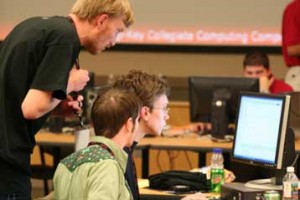[Editor: I am so happy to introduce another contributor – E. Price – who comes from an education background, with experience in teaching English in the UK curriculum, and will be bringing us many insights into the future of education and the progress that is being made in this area. Welcome Ms. Price!]
Here’s an interesting question, and one that raises a number of points for us at Future Conscience: are educational institutions doing enough to address the reality of the workplace in the twenty first century?
Of course, this starting point leads to a whole stack of other issues: Is it indeed a school’s job to reflect the reality of the workplace, or should they be considered in isolation of each other – as wholly differing life experiences? Are there enough government initiatives motivating schools and teachers to readdress the position of the workplace within education? Simply, are schools doing enough to equip pupils with the necessary skills to exist within the new social media based, collaborative-effort workplace that is emerging?

Education needs to meet the needs of the digital age
Inextricably linked to government initiatives are qualifications, and secondary school qualifications in the United Kingdom are currently undergoing a massive overhaul. There has recently been introduced a new qualification in the form of diplomas for 14-19 year olds. The government is claiming they are different to GCSEs and A-Levels because pupils have the opportunity to gain practical experience as well as formal qualifications.
A range of subjects have been introduced from Business Administration and Finance to Creative and Media. The government initiative is advocating that the diplomas “are designed for employers by employers so that young people are better prepared for work”.
The idea of the diploma seems to be an excellent one; preparing young people for the ‘real world’ as they say. My problem with this initiative lies in the HOW – how will it prepare young people better? What are the specifics to this new qualification? There is a lot of general, non-specific blurb about teamwork, problem solving and creative thinking, with little guidance as to how these would be achieved. There is one aspect of the diploma that does orientate itself, if not specifically to new social media, at least to the idea of a collaborative workplace ethic. Pupils will negotiate, to a certain extent, their own learning path by what’s available in their local area.
Assuming that Facebook and Twitter will continue to co-exist, I believe that they could utilise – indeed manipulate – these social media tools in their quest to provide themselves with a learning partnership. Pupils use social media instinctively, and by doing so they naturally develop the necessary skills to work collaboratively with each other, and I am sure that these skills could be carried forth into the workplace.
Whether there are enough government initiatives readdressing the place of the workplace within the confines of the UK National Curriculum is a question that remains open for debate – and whether there are enough successful government initiatives is also open for discussion. However, it’s clear that the concept of the workplace is not as alien to the pupils as it once was. We’ve certainly come a long way from the education techniques of the 1980s and have begun to properly incorporate modern information paradigms.
In fact, coming up soon is an opportunity for us all to see how the education sphere is encompassing the developments in technology with the Handheld Learning Conference, being held in London from the 5th – 7th of October 2009. It promises to deliver ideas about learning through the medium of mobile and inexpensive access technologies, and will be showcasing the latest efforts in the quest to bring education right up to date with current trends.
The conference, into its 5th year, will bring together a variety of people from the education, technology and entertainment industries including innovators and practitioners. Over the course of three days the delegates will “demonstrate, debate and explore how mobile technologies such as phones, entertainment devices, GPS locators, and netbooks can be deployed to enable transformational improvements in learning across schools, home, further education, training and business”.
The theme of the conference is Creativity, Innovation, Inclusion and Transformation and the key aims are to explore the value of these terms within the education sector, but more crucially to conclude that transformation can only ensue through universal inclusion. It is with such an egalitarian approach to new forms of education that the most impacting and important changes can be made. As the world increasingly becomes attached to technology and the workflow models that stem from this attachment, it is of vital importance that all of our young people gain an equal opportunity to learn how to use such avenues effectively.
Education is struggling to keep up to date with the rapid changes in technology and information flow. What is encouraging, however, is that there are very serious efforts being made to ensure that our primary and secondary school education systems are not left behind in favour purely of tertiary level qualifications.
Which makes perfect sense really, because the one thing we often forget is that the young people of today are growing up in a digital age – these things come naturally for them and are an integral part of their world. We must recognise this fact and harness natural abilities to ensure that their true potential is met.
[ad name=”Google Adsense-Link Banner x4″]




